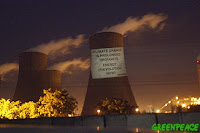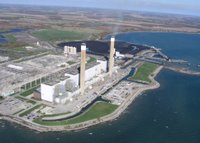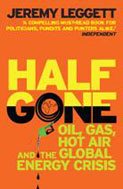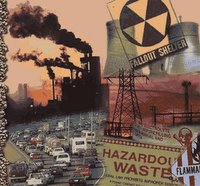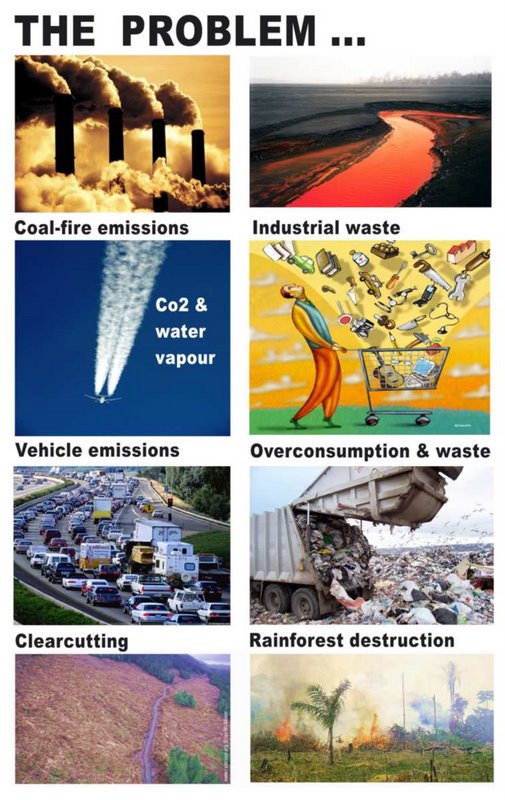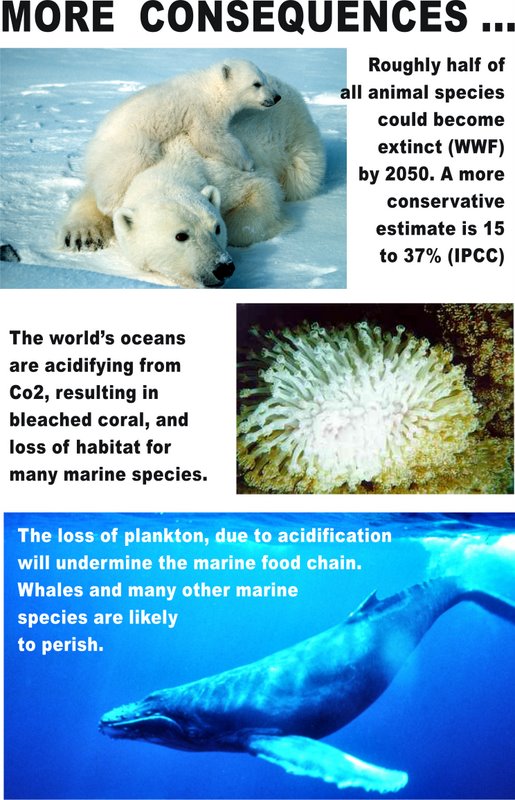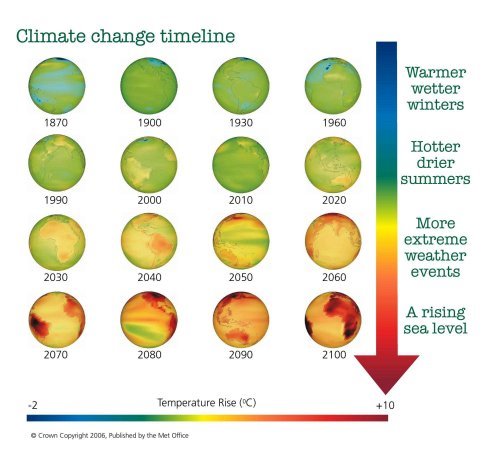Good move – “Escape From Suburbia” – Official world premiere:Toronto. June 28, Bloor Cinema, 506 Bloor Street W. The curtain rises at 7:00 p.m. sharp!
Join director Gregory Greene and producer Dara Rowland for this special performance.
Tickets may be purchased in advance on the site below, starting June 8 or at the Bloor Cinema box office the day of the show from 5:45 p.m.
All reserved tickets will be held at the theatre box office on June 28 after
5:45 p.m.
News alert – YesMen strike oilEXXON PROPOSES BURNING HUMANITY FOR FUEL IF CLIMATE CALAMITY HIT - Conference organizer fails to have Yes Men arrested
(Text of speech, photos, video: http://www.vivoleum.com/event/GO-EXPO statement: http://newswire.ca/en/releases/archive/June2007/14/c5086.htmlPress conference before this event, Friday, Calgary : http://arusha.org/event/7214Contact: mailto: fuel@theyesmen.orgMore links at end of release.)Imposters posing as ExxonMobil and National Petroleum Council (NPC) representatives delivered an outrageous keynote speech to 300 oilmen at GO-EXPO , Canada 's largest oil conference, held at Stampede Park in Calgary , Alberta , today.
The speech was billed beforehand by the GO-EXPO organizers as the major highlight of this year's conference, which had 20,000 attendees. In it, the "NPC rep" was expected to deliver the long-awaited conclusions of a study commissioned by US Energy Secretary
Samuel Bodman. The NPC is headed by former ExxonMobil CEO Lee Raymond, who is also the chair of the study. (See link at end.)
In the actual speech, the "NPC rep" announced that current U.S. and Canadian energy policies (notably the massive, carbon-intensive exploitation of Alberta 's oil sands, and the development of liquid coal) are increasing the chances of huge global calamities. But he reassured the audience that in the worst case scenario, the oil industry could "keep fuel flowing" by transforming the billions of people who die into oil.
"We need something like whales, but infinitely more abundant," said "NPC rep" "Shepard Wolff" (actually Andy Bichlbaum of the Yes Men), before describing the technology used to render human flesh into a new Exxon oil product called Vivoleum. 3-D animations of the process brought it to life.
"Vivoleum works in perfect synergy with the continued expansion of fossil fuel production," noted "Exxon rep" "Florian Osenberg" (Yes Man Mike Bonanno). "With more fossil fuels comes a greater chance of disaster, but that means more feedstock for Vivoleum. Fuel will continue to flow for those of us left."
The oilmen listened to the lecture with attention, and then lit "commemorative candles" supposedly made of Vivoleum obtained from the flesh of an "Exxon janitor" who died as a result of cleaning up a toxic spill. The audience only reacted when the janitor, in a video tribute, announced that he wished to be transformed into candles after his death, and all became crystal-clear.
At that point, Simon Mellor, Commercial & Business Development Director for the company putting on the event, strode up and physically forced the Yes Men from the stage. As Mellor escorted Bonanno out the door, a dozen journalists surrounded Bichlbaum, who, still in character as "Shepard Wolff," explained to them the rationale for Vivoleum.
"We've got to get ready. After all, fossil fuel development like that of my company is increasing the chances of catastrophic climate change, which could lead to massive calamities, causing migration and conflicts that would likely disable the pipelines and oil wells. Without oil we could no longer produce or transport food, and most of humanity would starve. That would be a tragedy, but at least all those bodies could be turned into fuel for the rest of us."
"We're not talking about killing anyone," added the "NPC rep." "We're talking about using them after nature has done the hard work. After all, 150,000 people already die from climate-change related effects every year. That's only going to go up - maybe way, way up. Will it all go to waste? That would be cruel."
Security guards then dragged Bichlbaum away from the reporters, and he and Bonanno were detained until Calgary Police Service officers could arrive. The policemen, determining that no major infractions had been committed, permitted the Yes Men to leave.
Canada 's oil sands, along with "liquid coal," are keystones of Bush's Energy Security plan. Mining the oil sands is one of the dirtiest forms of oil production and has turned Canada into one of the world's worst carbon emitters. The production of "liquid coal" has twice the carbon footprint as that of ordinary gasoline. Such technologies increase the likelihood of massive climate catastrophes that will condemn to death untold millions of people, mainly poor.
"If our idea of energy security is to increase the chances of climate calamity, we have a very funny sense of what security really is," Bonanno said. "While ExxonMobil continues to post record profits, they use their money to persuade governments to do nothing about climate change. This is a crime against humanity."
"Putting the former Exxon CEO in charge of the NPC, and soliciting his advice on our energy future, is like putting the wolf in charge of the flock," said "Shepard Wolff" (Bichlbaum). "Exxon has done more damage to the environment and to our chances of survival than any other company on earth. Why should we let them determine our future?"
(About the NPC and ExxonMobil: http://ga3.org/campaign/lee_raymond/explanationAbout the Alberta oil sands: http://www.sierraclub.ca/prairie/tarnation.htmAbout liquid coal: http://www.sierraclub.org/coal/liquidcoal/)
Why this matter cannot be put off any longer
The urgency of the matter is that NASA's top climate scientist James Hansen says we have perhaps 10 years left before it's too late to act, at which point the warmed earth and oceans will start emitting massive amounts of methane, accelerating the warming effect further. This will cause forests to start dying en masse, and the Greenland ice shelf will start raising sea levels.
All of these effects have already started, but they are expected to accelerate in coming years. The recent IPCC report confirms that this matter is very urgent and that warming is occurring 50% faster than first thought. This is the biggest long-term problem facing all of humanity: it endangers the lives of hundreds of millions and half the world's species.
Toronto Life Magazine just came out with an article (May, 2007) predicting that in 40 years Toronto would look like a Third World city, thanks to climate change.
For information on the "tipping point" see:
http://www.newscientist.com/article/mg19125713.300-one-degree-and-were-done-for.html
And for those who are sceptical regarding the economic costs, please refer to the Stern Report, which provides information on the considerable cost of inaction:
http://news.bbc.co.uk/2/hi/business/6096084.stm
Letter to Steven Harper from U-of-T student
This letter is from Shayla Duval, a student at University of Toronto and a member of Students Against Climate Change. Her letter is excellent and worth sharing.
Dear Stephen Harper,
I am writing to you because climate change is the most serious issue humankind has ever faced, it keeps me awake at night thinking about it, and I feel that your government is not taking the issue seriously. The notion that we can't meet the minor emission goals set by Kyoto is completely ridiculous and disheartening to me, considering that Kyoto is just a tiny first step in the fight against climate change. If we want to prevent climate change from reaching the critical point at which it will fall out of human control (once we hit the 2 degree increase in temperature) we will need to reduce our country's carbon emissions by 93% in the next ten years or so. Banning incandescent light bulbs does not an effective, multi-lateral agreement make; we need to get back in Kyoto , and help it develop further rather than trying to kill it.
I'm also concerned that your environmental minister John Baird is continuing to argue that meeting Kyoto targets will cause some kind of economic disaster. The idea that reducing the gases that lead to global warming will trigger economic disaster has been denounced as a myth by the Intergovernmental Panel on Climate Change. In fact, the IPCC said that stabilizing greenhouse gas emissions by 2030 could be accomplished at a cost of only three per cent of global GDP or less. The fact that your government continues to argue against this makes me suspicious that there is collaboration with oil and mining companies, and that these interests are being put above those of the Canadian public.
Your government's clean air agenda isn't cutting it either, and Canadians know it. For one thing, there are large chunks of it still missing: you forgot to include the exact sector-specific reduction targets for air pollutants, and the exact level of efficiency that we will be requiring of our vehicles by 2010. You also missed the part where we specific which "stringent, dominant North American standard" we're going to be benchmarking our auto regulations against. It doesn't take much to realize that this agenda is just political rhetoric.
With the sad state of Canadian environmental initiative as of late, I'm embarrassed to call myself a Canadian. I don't want to be part of a country that is so disrespectful of the environment and human lives. Please start taking some REAL action on climate change, and stop insulting the intelligence of Canadians with your token policies and greenwash.
Sincerely,
Shayla Duval
See Shayla's blog: The Environmentally Concerned Individual
Why the Provincial emissions plan is problematic
- The targets are weak. The Province’s plan doesn't go far enough to reduce emissions. Climate sciencists such as James Hansen says roughly 90% is needed. Aiming for 80% by 2030 would be good under the circumstances, but the Province is short of even that. This is not enough to avert the "tipping point" of 2 degrees increase above pre-industrial temperatures. Not one of the provincial parties actually advocates the cuts to emissions that the science suggests is necessary to avert disaster. OCAA reports that shutting down the coal plants would help Ontario meet 80% of its Kyoto targets.
- The method for achieving targets is weak. There is considerable criticism of "emissions trading" schemes due to their lack of enforceability and because they appear to reward polluters. Furthermore, the provincial emphasis on voluntary reductions by industry and consumers is insufficient. Tough regulations on energy rates are needed to achieve conservation. This means an end to public subsidies for rates to industry and big corporations.
- Insufficient public investment in public transportation and renewable energies. There is some investment in renewable clean energy sources but not nearly enough. Much more is needed. Germany 's 22,000 wind turbines produce more power than Ontario needs; why hasn’t Ontario invested in more wind turbines?
- Lack of stricter standards to restrict vehicle emissions. Ontario is far behind Californian and European emissions standards.
- The coal-plants need to be shut down. Premier McGuinty promised shut them down in 2007. This promise has not been kept, and the coal plants still do not have “scrubbers.” Raising hydro rates will reduce consumption.
- The Portlands Energy Centre and plans to build more nuclear reactors at Darlington are highly problematic: more GHGs in the first case (methane is a major GHG), and a whole host of problems in the case of nuclear power (waste disposal, safety, cost, GHG released through uranium mining and construction). Yet the Province is going ahead with these plans, despite major problems with old reactors never adequately addressed through environmental assessments or public consultation.
In summary, the Liberal plan could accomplish far more than it actually does. It could aim for 80% GHG cuts by 2030 (and even that would be risky - the goal should be 90% by 2020 or better); it could use stronger mechanisms for achieving those cuts; it could impose much stronger regulations on big business' profligate use of cheap energy, in order to achieve conservation goals; it could shut down the coal-fired power plants.
Ontario also needs to stop exporting its power to the U.S. Mandatory carbon taxation represents a good solution. Germany has shown that the standard of living does not have to be compromised to cut emissions to less than 50%. Why doesn’t Ontario implement carbon taxation?
These are but a few possible measures. All the good solutions, spelled out in detail by clean energy experts (Ontario Clean Air Alliance and others), exist and are on the record. Why are these solutions not being adopted?
Draft platform for discussion
A 95% reduction by industrialized nations by 2017 (based on the report by NASA's James Hansen) is actually required to guarantee that the "tipping point" is avoided.
Negative consequences of climate change include: one billion eco-refugees by 2050 AD, floods displacing 150 million, drought, increase in malaria and tropical diseases, mass extinction of species (up to 53% estimated), massive agricultural failure and famine, wars over scarce resources, possible worldwide economic failure, massive deforestation (including loss of Amazon and Congo rainforests), ocean acidification, loss of plankton (base of marine food chain), coral bleaching.
At 19 tonnes of Co2 emissions per capita per annum, Canada has one of the worst records in the world on greenhouse gas emissions.
The expansion of the Alberta oil sands project from one to five million barrels per day would guarantee that Canada fails to effectively its greenhouse gas emissions.
The Climate Change Accountability Act (Bill C-30, the NDP’s reworking of The Clean Air Act which Al Gore called a “fraud”) has not yet become law because it requires Canada to comply with Kyoto standards and the Harper government continues to refuse to abide by Canada ’s Kyoto commitment. See http://www.ndp.ca/page/4570 Please note that the Clean Air Act is NOT the same thing as the Clean Air and Climate Change Act.
The Harper government just signed a non-binding pact with G8 nations to work towards a 50% reduction in greenhouse gases by 2050 AD through voluntary action (i.e. no strict government regulations on polluting industries). This is insufficient to avoid the “tipping point.”
Given these facts, Students Against Climate Change urge the following:
- The adoption of a program of carbon taxation for all sectors of society.
- A moratorium on all clear-cutting in Canada because trees act as carbon sinks. This is to be coupled with "green" transition jobs project for loggers.
- Shut down the monumentally destructive Alberta oil sands project, and also implement a “green” jobs transition project for those workers. Currently the government is planning to expand the oil sands project from 1 to 5 million barrels of oil production.
- End to all tax subsidies to oil and coal and mining exploration and production (approximately $1.4 billions per annum).
- Following on the Homes Not Bombs model, pull Canadian funding for new weapons research and development and funding, and put all such funds towards social housing and especially restoration of existing housing stock through subsidies for green renovation projects designed to reduce carbon emissions and energy waste.
- End to all short-haul air flights in Canada , and increase funding for railway transit, to improve safety standards, as an alternative. Fallback position: legislate mandatory carbon offsets for all air travel.
- Massive public funding in clean alternative energy sources (excluding nuclear energy and biomass fuels, which are both problematic for several reasons). Clean energy sources, include wind, solar, wave and natural gas. Example: Germany 's 22,000 wind turbines produce more electricity than what Ontario currently uses.
- Ban cars (except for hybrid taxis) in the downtown cores of major Canadian cities, coupled with an increase in funding for public transit, and higher taxes on gasoline, with all funds going into clean renewable energy sources. Fallback position: restrict car travel in the downtown of urban cores where public transportation systems exist, through increased parking fees and/or tolls; the City of Toronto is currently examining.
Precedent-setting legal challenge against Harper over KyotoFriends of the Earth Canada (in Ottawa ) have launched a lawsuit against the Federal government over their failure to act in accordance with Kyoto .
This lawsuit is important and needs to be supported. Something similar was launched in the U.S. against the Bush "carbon criminals" and the good guys won at the Supreme Court! So it will probably win here.
This case is major news. They are fundraising to support the action. If you give money to environmental causes, give to this one. It is very worthy.
First global warming lawsuit in Canada:
http://www.foecanada.org/index.php?option=content&task=view&id=318&Itemid=135"The perennial question: compromise or absolute standards?"(Opinion piece by Paul York)
Failing to cut emissions by 90% by 2030 could be problematic because even one more degree of global warming will cause a massive "positive feedback" effect to accelerate out of control, eventually driving temperatures up to 4 degrees above pre-industrial temperatures (or well above). The sciences and common sense dictates immediate and massive cuts in emissions.
Every degree's increase will mean death for tens of millions of people and billions of animals. Allowing the global temperatures to go up further is an act of mass murder. We do not have to investigate too deeply to discover that this is not an exaggeration: drought, floods, hurricanes, disease, famine – the list of possible catastrophes is mind-boggling.
The concessions and compromises environmentalists make for the sake of getting any movement at all is understandable, but (in my opinion) inadvisable because it loses sight of the what the the science dictates, and what conscience dictates. The moral imperative that taking a stand on this matter implies is beyond dispute.
Through self-censure and compromise in deference to what is "realistic" we step onto the slippery slope of a political game mastered by those who are willing to sacrifice the planet for profit. If you are not prepared to take a decisive moral stand, why be concerned with social and environmental justice to begin with?
Constant compromise erodes the soul eventually; why not stand up for what is absolutely good and just and right all of the time? To do otherwise lends itself to the danger of a Faustian pact, in my view. Of course, each person must act of their own free will on this matter.
Tuesday Protest at Queen’s Park – more informationVisit the following link for more information and a sample letter to be sent to Premier McGuinty, John Tory and Howard Hampton to encourage the closing of Ontario coal plants.
http://ontario.indymedia.ca/twiki/bin/view/Ontario/GLOBALWARMINGANDSHUTTINGDOWNONTCOALPLANTSBELOW: From the
Ontario government's own website:
"Recent reports conclude that in 2005 more than 29 million minor illnesses, 59,000 emergency room visits, 16,000 hospital admissions and more than 5,800 premature deaths in Ontario were caused by smog."
"It is estimated that in Ontario the environmental, health care and societal costs of smog are $10.8 billion annually. If the current trend continues, these figures would rise to more than 38 million minor illnesses, 87,000 emergency room visits, 24,000 hospital admissions and 10,000 premature deaths by 2015."
2003 Liberal Campaign Platform:
"Air pollution kills 1,900 of us every year and many of us do not trust our water. Cleaning the air we breathe and the water we drink will go a long way to improving the health of all Ontarians. That is why we have committed to replace our coal-burning plants, Ontario's biggest single sources of air pollution, with cleaner energy sources."
Dalton McGuinty
(Hansard - September 23, 2002):"You may be prepared to sit on your hands for 13 years while 1,900 people die a premature death every year, while 13,000 people, mostly kids, have to go to emergency rooms. The single greatest cause of admission into Ontario hospitals today, Premier, you should know is asthma, aggravated by bad air. Taxpayers are spending over $1 billion annually on health care costs and lost work days."
Here is an excerpt from the Ontario Clean Air Alliance the Toronto-based NGO that did a lot of lobbying against the coal plants for years:
Nanticoke No. 1 source of greenhouse gas emissions that cause climate changeOPG coal plants are Ontario 's pollution giantsFebruary 1, 2007 - The staggering emissions from Ontario ’s four coal plants make Ontario Power Generation (OPG) a giant among polluters, says a new report released today by the Ontario Clean Air Alliance (OCAA). OPG: Ontario ’s Pollution Giant finds that the coal burners are not only massive air polluters, but also significant producers of toxic wastes that are being landfilled on site or sent to other locations for disposal."When it comes to emissions of smog pollutants and greenhouse gases, OPG’s coal plants are Ontario ’s pollution giants. In fact, OPG’s coal plants produce 40% of the carbon dioxide emissions (the major greenhouse gas that causes climate change) reported by Ontario industrial facilities to Environment Canada and continue to be Canada’s #1 corporate source of greenhouse gases," points out Jack Gibbons, Chair of the OCAA.Emissions of carbon dioxide from the Nanticoke and Lambton plants increased by 20% from 2004 to 2005 and have increased by 90% for all the coal plants since 1995. Equally alarming, the actual emission rate (tonnes of carbon dioxide per gigawatt-hour of electricity produced) for the plants has increased by 7% since 1995.OPG’s coal plants are also responsible for:- 36% of Ontario ’s airborne mercury emissions;
- 28% of Ontario ’s industrial smog-causing nitrogen oxides emissions;
- 23% of Ontario ’s industrial smog-causing sulphur dioxide emissions; and
- 8% of Ontario’s industrial PM2.5 small particulate emissions that go deep into our lungs and cause asthma attacks, heart and lung diseases, strokes and premature mortality.
"But then when we turn our attention to OPG’s other waste streams, we see that it is also a big producer of wastes such as ash that contain Canadian Environmental Protection Act (CEPA) toxics like arsenic and mercury which it either landfills on its own property or ships offsite to cement plants and road builders," Mr. Gibbons says.OPG’s Nanticoke and Lambton coal-fired power plants are among Ontario ’s top 5 on-site landfillers of arsenic, lead and mercury.OPG’s coal plants also shipped ash containing mercury and other toxics to cement plants in Bath and St. Mary’s, Ontario , as well as to Michigan , where it is re-heated in cement kilns."When we stack up OPG being a leading emitter in all the major air pollution categories with being a leading on-site landfiller of solid wastes containing a broad cross section of toxic materials, and, in turn, add to this it being a shipper of significant quantities of pollutants to other facilities, we start to see more clearly that the giant polluting footsteps of OPG’s coal plants lead everywhere and cross many paths," says Mr. Gibbons."This also points to the futility of trying to solve the problem of coal plant pollution with largely ineffective end-of-pipe scrubbers or other controls that will increase its greenhouse gas emissions and its quantities of toxic waste sent to landfills and cement kilns," Mr. Gibbons added."The only real solution is to cut the giant down to size by eliminating coal burning and adopting cleaner solutions, like aggressive efficiency improvements, renewable power and highly efficient combined heat and power generation. Premier McGuinty should keep his promise to phase-out our dirty and toxic coal plants by 2009", Mr. Gibbons said.
If you'd like to be added to SACC's mailing list, contact
Paul.























































































































































































































































.jpg)





































































































